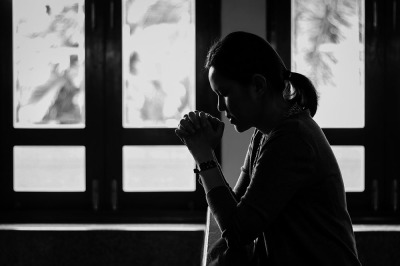Shootings and the disparagers of prayer

Saint Paul wrote that some hearers viewed the “preaching of the Gospel” as “foolishness.” Now, in the era of mass shootings and random violence, some critics regard as foolishness the expression of “thoughts and prayers” offered by well-meaning individuals. “Prayer shaming became rampant in our culture,” says Dr. Paul Kattupali, anMD.[1]
So, a writer following the Birmingham tragedy judged “thoughts and prayers” as pointless.
The disparagers of prayer probably have never experienced a moment when prayer, praise, and worship broke out in an assembly of inmates in a Virginia jail noted for its toughness. I was there that night when, through song, testimony, and prayer, led by a church youth choir, the glory of God was manifest, and inexplicable joy and peace broke through into the grim room as convicts and choir members prayed passionately in a variety of words, but one voice directed toward Heaven. Prayer-fueled revival swept into the bleak auditorium, and the very atmosphere was changed.
Years later, I sat on a hard bench in another jail on Robben Island off the coast of South Africa, where Nelson Mandela had once been imprisoned. On that afternoon I listened as a former inmate who had become a guide there told us how, years before, Christ’s transformation had come into his life as fellow prisoners prayed for him in that very chamber. The change was so great that, later, after the prisoner had been released, he encountered on an isolated path one of the white guards who had abused him. He ran to the former adversary, not to repay him with evil in that deserted spot, but to express forgiveness, which the former prisoner believed to be the only hope for individuals and for the nation itself.
The elderly white man thought he was about to die but instead was blessed as the person he had once incarcerated and beaten shook his hand and spoke grace and love to him.
At the University of Cape Town, I watched the glory of Heaven fall on a crowd of South Africans, Black and White, as they joined hands and prayed, as brothers and sisters in Christ, in a nation where once they could not walk on the same side of the street.
I wish the critics of “thoughts and prayers” could have been with me one night in 1969 in New York’s Madison Square Garden. A group of us clustered around and prayed for Dr. Billy Graham, who was about to proclaim the Gospel in that great hall.
Word came that there might be an attempt to assassinate Dr. Graham as he stood on the platform, possibly by people coming forward when he gave the invitation to receive Christ. Would he preach? If so, would he eliminate the invitation to come forward? Would the whole event be canceled?
The decision was that he would preach anyway. Further, Dr. Graham would give his invitation for people wanting prayer to come to the platform. Would a potential killer use that as a means of drawing close enough to shoot Graham?
Later, standing at the edge of the gathering group, I was close enough to see Billy Graham’s face glowing with joy and steady with the courage God had stirred in his great soul.
Was the threat only a rumor, or did the prayers change the atmosphere inside the Garden so that the potential assassin was moved to give up? I don’t know, but what I do know was that there was a fervency of intercession going on for Dr. Graham’s security and a great harvest of men and women for Christ and His Kingdom.
Time after time as a pastor I have experienced the effects when a cold hospital room is changed into a place of prayer.
I experienced this while praying for a young father dying of cancer, and saw the Holy Spirit put confidence and assurance on his face — not that he would survive the disease — but that God had his loved ones in His hands so he could die in peace.
I left that room and walked to another just feet away from where, at the request of an aide, I prayed for Governor George Wallace. Through the intercessions of many, the man who was the very symbol of forced segregation had sought forgiveness from Black people hurt by his policies as governor of Alabama. On the day I prayed for him at the Birmingham hospital he was suffering intense pain from an assassination attempt. Though his body was imprisoned in pain and immobility, his soul was free through Christ because Christ’s people had prayed for him.
I could go on and on.
The prayer-disparagers grieve me because perhaps they have never experienced the wonder and glory of Holy Spirit-enabled prayer.
The spiritual concern is the most important of all in our present plunge into chaos because guns and knives and clubs and poisons and speeding cars are not sinners, but humans who use them for evil are.
The only way this tragic descent into madness can be stopped is by the transformative power of God working in the human heart, through the intercessions of Holy Spirit-anointed people.
So, critics, laugh at us all you want, but we will not dismiss from our minds those who lost their lives so tragically and the loved ones left behind horribly grieving.
Nor will we stop praying for them.
[1] Texas School Tragedy: Are God and Prayer useless? – Defender's Voice (doctorpaul.org)
Wallace B. Henley is a former pastor, daily newspaper editor, White House and Congressional aide. He served 18 years as a teaching pastor at Houston's Second Baptist Church. Henley is author or co-author of more than 25 books, including God and Churchill, co-authored with Sir Winston Churchill's great grandson, Jonathan Sandys. Henley's latest book is Who will rule the coming 'gods'? The looming spiritual crisis of artificial intelligence.




























